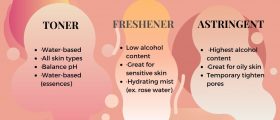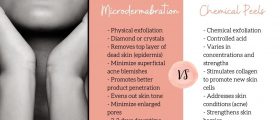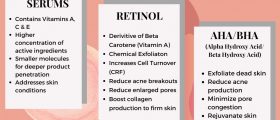
5 Ways Hormones Can Impact the Skin
Many will agree that health issues are related to the burden of finances (prescriptions and medical supplies) and doctor’s appointments (paid-time -off). These same health issues can cause your self-esteem when it impacts your skin. Whether it be by dry, sensitive, itchy, or having crepe skin, it’s important to understand the root causes for a better approach to long-term skin wellness.
What are hormones?
Hormones: internal messengers for the body system and internal factors for the appearance, strength and skin health.
Hormonal skin: internal factors that can disrupt your skin barrier causing adverse outcomes to the condition of your skin.
Factors
Stress
Stress not only indicates the kind of day you may have, but it can also put a damper on your skin. Stress causes hormones to fluctuate and increases sebum production. Adrenalin, which is produced from androgen, is naturally produced when stress transpires, stimulating the sebaceous gland that cause breakouts. Just take a deep breath, take some chamomile tea and tackle the problem. The blackheads are not worth the added stress.
Puberty, Pregnancy and Menstrual Cycles
Male Hormones called androgens stimulate the sebaceous glands. High levels of androgen increase oil production. These hormones increase during puberty, hence teenage acne in boys.
Adult acne is more prominent in females. Depending on the birth control, premenstrual cycles can lead to acne inflammation. Although testosterone is prominent in men, women assess a small amount. Testosterone is prominent during the first trimester of pregnancy, making breakouts common during this time.
Autoimmune Conditions: Lupus, Thyroid, Cancer
Unfortunately, these conditions are a battle itself. With the therapy a person undergoes and the medication, side effects includes dry skin, loss of elasticity, sensitivity and inflammation because of their unbalanced skin barrier. Chemotherapy will plunge the body into menopause, increasing the aging process.
Hormone imbalance:
Menopause & Mature Skin
Estrogen is a hormone that’s present in both women and men, more dominate in women of course. Estrogen is an antioxidant an anti-inflammatory which are key factors to skin repair. It’s responsible for maintaining health, coordination, balance, moisture, bone loss and vision. When estrogen is depleted, fibroblasts (makes collagen and elastin) begins to decrease, making the skin to lose its tone and increase fine line and wrinkles.
Microcirculation occurs as well. It’s when dilation or enlargement of the capillary wall occurs. The wall fills with blood and will sometimes bursts. Red botches and rosacea are the result.
Insulin Resistance: PCOS
insulin resistance can contribute to hormonal imbalance, mostly estrogen-disturbing ones. Women with PCOS (Poly Cystic Ovary Syndrome) have elevated androgen that shows up more frequently due to irregular menstrual cycles. Eating high amount of refined sugar can mimic the same symptoms.
What can you do?
It’s recommended that you visit an Integrative Medicine Specialist to determine if any of these or other symptoms are impacting your skin. In the meantime, invest in plant and peptide-based products can assist in restoring the positive state of your skin. Other suggested ingredients:
- Green Tea
- Chamomile
- Allantoin
- Vitamin E
- Rose Hip
- Squalane Oil
- Licorice Root
These factors are underestimated when it comes to skin health. Understanding hormonal skin is the first step in tackling the issue. Lifestyle and food choices minimize the causes. Together, we can harmonize towards healthier skin happiness.













Leave a Reply
Be the First to Comment!